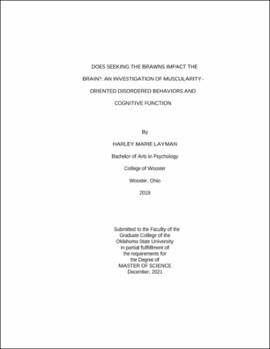| dc.description.abstract | Brain health is impacted by body composition as well as associated health behaviors. The current shift in body-image ideals towards a more lean and muscular body has revealed new eating and exercise behaviors that may be related to cognitive function. The goal of this thesis is to investigate possible longitudinal relationships between a drive for muscularity and associated muscularity-oriented disordered behaviors (MODBs) with cognitive performance. Data were primarily drawn from Add Health - a national longitudinal database - Waves III and IV with supplemental results from Wave V. Drive for muscularity and MODB engagement were gathered during a home interview in emerging adulthood. Cognition variables included short-term verbal memory, long-term verbal memory, and working memory measured via immediate word recall, delayed-word recall, and number recall, respectively. Results of a one-way ANCOVA revealed that those with a drive for muscularity had significantly lower immediate word recall (F(3, 12819) = 3.845, p = .009), delayed word recall (F(3, 12807) = 5.933, p < .001), and composite cognition scores (F(3, 12843) = 6.080, p < .001) than the other weight goal groups after controlling for covariates. Next, hierarchical linear regressions were conducted to assess the association between composite MODB scores, as well as individual MODBs, and cognitive outcomes. Legal PES-use (ßs = 0.06-0.07, p < .05) and exercise (ß = 0.06, p < .05) were positively associated with some of the cognition scores after taking covariates into account. Conversely, lifting weights (ß = -0.06, p < .05) and eating different foods than usual (ß = -0.05, p < .05) exhibited negative associations with some of the cognitive outcomes. Composite MODB score was not related to cognitive variables. Future research should be conducted to examine other potential outcomes related to the drive for muscularity and associated MODBs. | |
